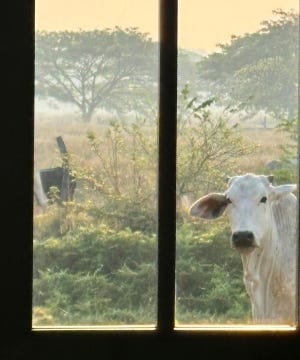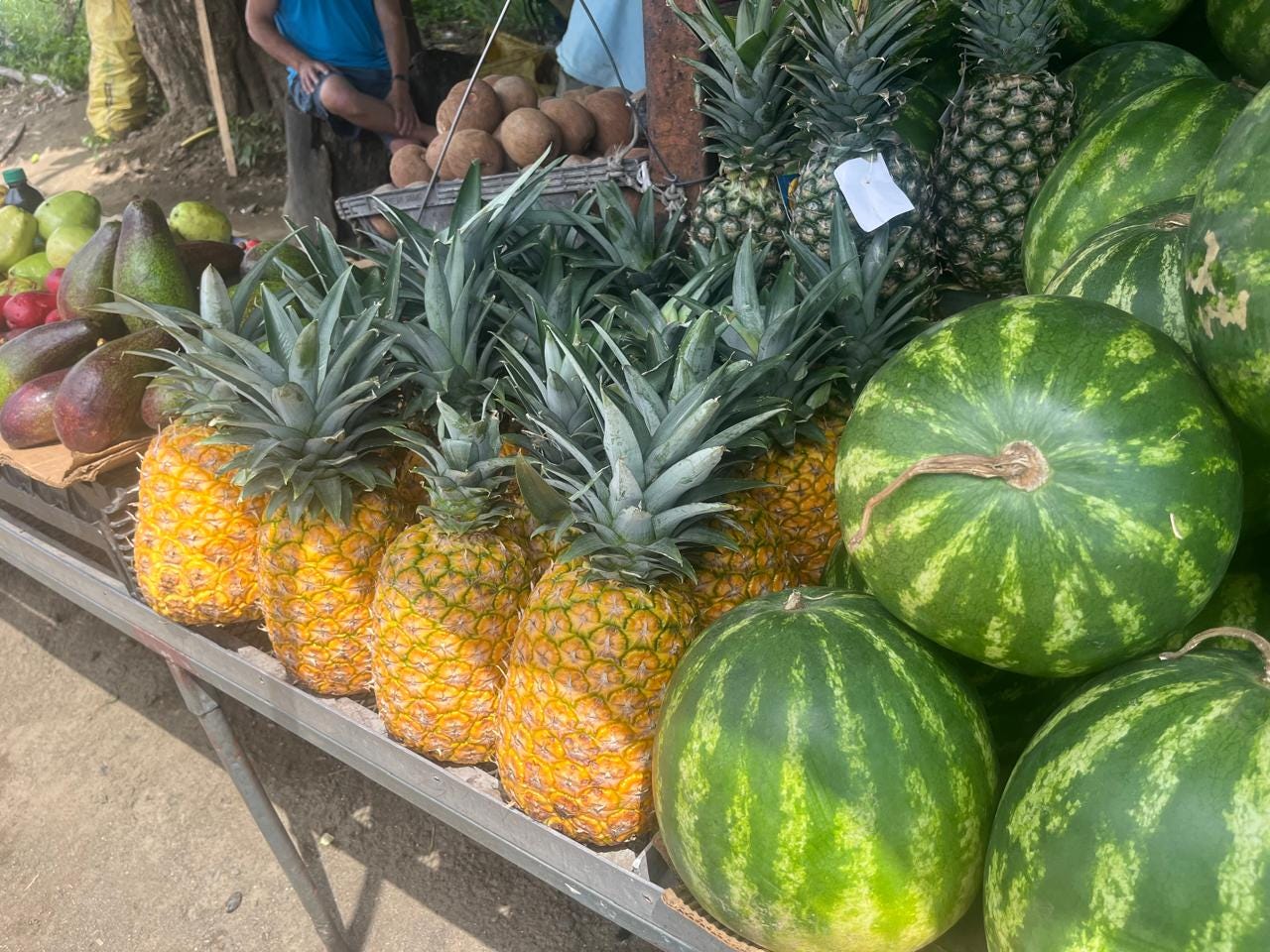In Costa Rica, in May, there is pineapple.
This may not strike you as particularly revelatory. There is pineapple in May in many places. In smoothies, mostly, or upside-down cakes. Canned, crushed, cubed, and pressed into juice boxes. But I don’t mean those pineapples. I mean pineapple as it lives here, in the Pacific northwest of the country, just inland from the black-sand beaches where the trees come down to the surf like gossiping old women. I mean the fruit that stands—not stacked, not bagged, not reduced—but standing.
It stands in rows at the corner fruit stand in Comunidad. Not heaped like the bananas, bruised and overconfident in their abundance. Not crammed like the papayas, which are somehow always too large, too orange, too much. The pineapple holds its space. Pointed leaves skyward. Armour intact. No special pricing. No poetic sign. Just pineapple.
This is May in Guanacaste, after the burning season but before the rains. The black scorch marks have faded to memory now, though the smell of cane smoke lingers — low in the air, faint and sweet, as if the land itself is still exhaling. The world here is not green, not yet. Or rather: not only green. It is a thousand shades of brown — gold-brown, ash-brown, velvet-dust brown — and in between, the occasional leaf so violently green it startles you. A kind of color ambush. You don't walk through this landscape; you are watched by it.
Go fifteen minutes inland — that’s all it takes — and the beach towns fall away. The infinity pools, the real estate signage in English, the bars with surfboard chandeliers. Out here, the rhythm resets. People are already moving. At the bus stops, early, waiting in clusters with their shirts tucked in, headed for shifts in the hotels along the coast. Others open shops, water plants, sweep dust off concrete that will collect it again by noon. Nobody’s trying to impress you. They’re just living. Life here doesn’t ask to be noticed. But it holds its shape.
The birds understand this too. They move without announcement, without spectacle. Spoonbills pass through puddles without checking the mirror. Egrets stalk the edges of fields like managers inspecting progress. Vultures line the wires above it all, unhurried, unimpressed. They don’t mind if you look. But they don’t need you to.
The cattle are lean, a little desperate. They gather around the melon piles, cracked cantaloupes, exploded honeydews, watermelons with their hearts exposed. They nose through the wreckage like detectives at a crime scene. Nothing elegant about it. But necessary.
Farther down the road, mangoes rot sweetly under limp umbrellas. Mamones, too. The kind that take some effort to eat, like you're cracking open a seed to reach something soft, sour, and ephemeral. They're stacked in piles that seem like they might collapse from their own optimism. But not the pineapple. The pineapple has composure.
At the small market, I buy one for the price of a coffee in London. Not a double oat cortado. A real coffee. A bad one. One pound fifty, if you like. The woman slices off the top with a practiced flick of her wrist. She offers to peel it for me. I decline. I want the full ritual—the hacking, the dripping, the sweet sting on the fingers.
Back at the house, I eat it standing up, over the sink, with the overhead fan pretending to be wind. The taste is cold, electric, yellow-gold and urgent. It’s the taste of my honeymoon, which took place on this same coast many years ago, back when we were still calling ourselves brave for leaving the country. It’s the taste of late pregnancy, when everything else made me sick. It’s the taste of Saturday afternoons with people I still call friends, although we live in different time zones now.
The pineapple is industrial here. Of course it is. It’s grown in long anonymous fields by people who are paid too little and protected even less. It is shipped north in chilled containers and rebranded as Hawaiian before being sold in Whole Foods for twenty-five dollars. But none of that changes what it is right now: a fruit, yes, but also a kind of stillness. A presence.
You cannot hurry a pineapple. It ripens on its own terms. It makes you wait. It cuts your tongue if you're impatient. It rewards you if you're not.
The pineapple is not a metaphor. It’s just real. Remarkably, solidly, sensuously real.
And in a landscape of melon carnage, waiting trees, birds with attitude, sugar-cane ghosts, and tourists sweating through overpriced linen, the pineapple remains upright. Singular. Golden. Unbothered.
And honestly, in May, that’s something to aspire to.
Come With Me
You’re standing with me at the corner fruit stand in Comunidad. It’s May. There’s dust on your flip-flops, sweat under your collar, and the man in front of us is holding a bunch of bananas like they’re a riddle he can’t quite solve. We’re here for the pineapple. You pick it up. It’s heavier than it looks. You don’t have a notebook. That’s fine. You don’t need one yet. Just hold it. Feel the weight. Now — let’s write.
Mini Workshop: Over the Sink, With Your Hands
On writing when everything is sticky, loud, and not at all ideal
You know how you’re meant to write.
You’re meant to rise early, open the window, drink something herbal and wise. You’re meant to stretch your neck and then your soul. Light a candle. Turn off your phone. The desk is bare. The mind is empty. The words come. They always come.
You know this fantasy. You've read it in a Paris Review interview. You’ve seen it on someone else’s Instagram.
And then there’s how you actually write.
Which is over the sink. With pineapple juice on your hands. Half-listening for the kettle. At the table with a child beside you trying to explain the metaphysics of Minecraft. In the car before school pickup. Between emails. After the email that ruined your morning. While still in your swimsuit. While still in yesterday.
Here is the truth: writing doesn’t require a candle. Or silence. Or a lake. It doesn't need the Good Chair. Or solitude. Or sincerity, even. It only needs attention. And your attention can be messy. Divided. Sticky.
So try this instead.
The One-Sentence Loop
Wherever you are, however chaotic or humid or absurd:
Write one sentence. Just one.
Then ask yourself: What next?
Write the next sentence.
And then the next.
Don’t plan. Don’t title. Don’t decide whether it’s a story or an essay or a very long sigh. Just keep going until something surprises you. Or interrupts you. Or you laugh a little. That counts as success.
Here’s a sample, pulled from thin air:
The fan was still broken, and everything smelled faintly of overripe mango.
She opened the fridge like it might change her mind.
Inside: half a lime, a mystery tupperware, and a single golden pineapple that looked smug about it.
That’s enough. Nothing resolved. No moral. But there’s voice now. There’s rhythm. There’s someone in the room. Which is often more than half the work.
This is not a writing strategy. It’s a survival instinct.
You don’t need inspiration. You need the sentence you can write while standing up, holding a paring knife, with fruit juice running down your wrist.
Write that sentence. Then the next.
You’ll find the thread. Or you won’t. But you’ll be writing.
And for now, on this Unretreat, in this heat, that’s the whole point.
Invitation to Play
One Sentence, Then Another — But Looser
This is not a test. This is not an assignment. This is not that thing your writing professor made you do that made you hate your notebook for six months.
This is a game.
Here’s how to play:
Wherever you are, grab something to write with. Anything will do — a receipt, your notes app, your child’s homework margins. (Apologies to your child.)
Write a sentence that begins with:
“Right now, I could be...”
For example:
“Right now, I could be harvesting pineapples, or spying on my neighbours, or pretending to be a better version of myself.”Follow it with another sentence that disagrees entirely.
“But instead I’m googling the side effects of mangoes.”Then write three more sentences, each one stranger or more specific than the last.
Lean in. Get weird. Surprise yourself. Think less: narrative arc, more: fruit-fuelled spiral.Stop when you laugh. Or when someone asks you what you're doing and you say “writing” and then immediately apologise.
This isn’t about making something good. It’s about loosening the grip. Laughing a little. Seeing what sweetness might fall out if you stop trying so hard to squeeze it.
There is no prize.
There is no word count.
Only you, and the next sentence. And maybe some juice on your hands.
About Me
I’m the sort of writer who likes deadlines and resents them. I believe in coffee more than clarity. I’ve written Flash, CNF, short fiction, and longer fiction, taught classes, and led workshops, but I still get nervous about opening a blank page. I think white space is a kind of genius. I think you are not wrong for hesitating.
This summer series is for you — if you write, want to write, or need to be reminded that art can begin in small, defiant scraps. I’ll be writing from the road, from café tables and slow trains and sun-warmed stone steps. You can write from wherever you are.
You’re already here. That’s enough.







The pinneapples in Costa Rica! Could read and read and read about them. I loved: "Life here doesn’t ask to be noticed. But it holds its shape." It's nice to be reminded that one sentence at a time is play!
Thanks for this writing posture, Rena. So rich and so stripped down at the same time. Your pineapple piece reminds me a little of Neruda’s idea, especially the one to the artichoke.